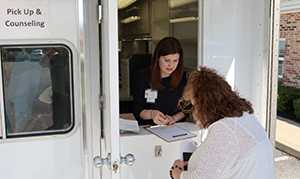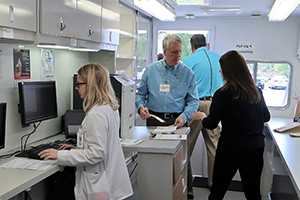Public Health Preparedness Resource Helps Kentucky Fight Opioid Overdose Epidemic
Preparedness Funds Transform Trailer into Emergency Pharmacy
While sheltering Louisiana residents displaced by Hurricane Gustav in 2008, emergency response leaders in Kentucky struggled to establish a safe environment to dispense medication. The incident sparked an innovative idea—to create a new deployable resource that could be used as a fully functional mobile pharmacy during an emergency.
Using PHEP funds, the Kentucky Department for Public Health purchased a trailer and established a partnership with the Kentucky Pharmacists Association, which ensured that the trailer met all regulations required to be a stand-alone pharmacy. Today, all licenses and permits have been obtained. The unit is available for deployment in case of a disease outbreak, natural disaster, or other emergency in any part of the state.
Mobile Pharmacy Targets Opioid Overdose Problem

The PHEP-funded mobile pharmacy has become an important tool in fighting Kentucky’s devastating opioid overdose epidemic. In December 2016, the Department for Public Health and the Kentucky Pharmacists Association began partnering with county health departments to train community members to recognize overdose symptoms and administer naloxone, a medicine which can prevent death from opioid overdose. Once trained, participating community members receive naloxone kits that they can use in their communities if they encounter someone suffering from an overdose. Kentucky has the third highest overdose mortality rate in the nation as of 2015, about 29.9 deaths per 100,000, making local access to naloxone critical.
Molly McKinney, a public health professor at Eastern Kentucky University, encourages all of her students to attend a training event in their area. “Kentucky is rife with opiate use and abuse,” she said. “Many of my students know someone—a family member, a friend, or a loved one—who is dealing with addiction. Because of their participation in this training, students may be able to save a life.”
PHEP Funds Build Local Capacity to Save Lives

In about a year, the mobile pharmacy has been present at approximately 20 events. Nearly 1,000 community members have received naloxone kits and accompanying training, ensuring that they have the skills and medicine to save lives. According to Lloyd Peniston of the Kentucky Department for Public Health, “Without PHEP funding, we wouldn’t have the mobile pharmacy, the partnership with the Kentucky Pharmacists Association, or the staffing to carry out this valuable program in the communities that need it the most.”
- Page last reviewed: September 1, 2017
- Page last updated: September 1, 2017
- Content source:


 ShareCompartir
ShareCompartir